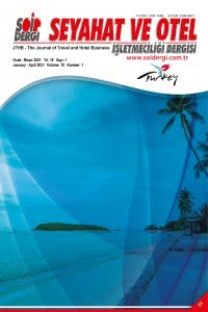Daha İyi Bilim için Daha Çok Edebiyat
Daha İyi, Bilim için, Daha Çok Edebiyat
___
- Alvesson, M. Gabriel, Y., ve Paulsen, R. (2017). Return to Meaning A Social Science with Something to Say. Oxfor University Press.
- Alvesson, M. ve Gabriel, Y. (2013). Beyond Formulaic Research: In Praise of Greater Diversity in Organizational Research and Publications. Academy of Management Learning & Education, 12(2): 245–263
- Alvesson, M. ve Spicer, (A.) (Un)Conditional surrender? Why do professionals willingly comply with managerialism .Journal of Organizational Change Management 29(1): 29-45
- Baucekova, S. (2015). Dining Room Detectives: Analysing Food in the Novels of Agatha Christie. Cambridge Scholars Publishing
- Bauman, Z. ve Riccardo, M. (2019). Edebiyatta övgü. (A. Emre Pilgir, Çev.). İstanbul: Ayrıntı Yayınları.
- Beer, D. (2016). Fiction and social theory: E-special introduction. Theory, Culture & Society, 33(7–8), 409–419.
- Bennis, W., ve O'Toole, J. (2005). How business schools lost their way. Harvard Business Review, 8(3), 96–104 (May).
- Bevan, D. (1988). Literary Gastronomy. Amsterdam: Rodopi B.V.
- Bourdieu, P (1996). The Rules of Art: Genesis and Structure of the Literary Field. Stanford, CA: Stanford University Press.
- Brehm, J.W. (2008) [1966]. A Theory of Psychological Reactance. In: Burke, W.W., Lake, D.G., and Paine J.W. (eds). Organization Change: A Comprehensive Reader, San Francisco: John Wiley & Sons, 377-391.
- Cuma, A. (2009). Edebiyat sosyolojisi ve araştırmalı edebiyat bilimi. Sanat ve bilimin sınır ötesi etkileşimi. Selçuk Üniversitesi Sosyal Bilimler enstitüsü, 22, 81-94.
- Czarniawska-Joerges, B. Monthoux, G. P. (2005). Good Novels Better Management: Reading organizational studies. Harwood Academic Publishers.
- Dolgun, U. (2016). Edebiyat sosyolojisinin imkan(sızlığ)ı. Hürriyet Gösteri Sanat-Edebiyat Dergisi. 126-140.
- Dolgun, U. (2021). Edebiyat Sosyolojisi yapmak ya da yapmamak. Edebiyat Sosyolojisini Güncel Kılmak, Aziz Şeker - Emre Özcan, Editör, Nika Yayınevi, Ankara, https://www.researchgate.net/publication/355887700_EDEBIYAT_SOSYOLOJISI_YAPMAK_YA_DA_YAPAMAMAK
- Goffman, E. (1959). The Presentation of Self in Everyday Life, Garden City: Doubleday.
- Harrington, A. (2004). Art and social theory: Sociological arguments in aesthetics. Cambridge: Polity Press.
- Hoggart, R (1966) Literature and society. The American Scholar 35(2): 277–289.
- Hubbard, D. ve Lindsay, M. (2012). From significant difference to significant sameness: Proposing a paradigm shift in business research. Journal of Business Research.
- Iluţ, P. (2009). Psihologie socială și sociopsihologie [Social Psychology and Sociopsychology], Iași: Polirom.
- Longo, M. (2015). Fiction and Social reality. Literature and Narrative as sociological resources. Ashgate Publishing Limited.
- Merril, Francis E., (2004): Sosyolog Olarak Balsac: Bir Edebiyat Sosyolojisi İncelemesi, çev.: Köksal Alver- Mustafa Fişne, içinde: Köksal, Alver, Edebiyat Sosyolojisi İncelemeleri, Hece Yay., Ankara, s. 43-56
- Mises, L. (1996). Human Action: a Treatise on Economics, San Francisco: Fox & Wilkes.
- Nisbet, RA (1962) Sociology as an art form. Pacific Sociological Review 5(2): 67–74
- Nisbet, RA (1977) Sociology as an Art Form. Oxford: Oxford University Press.
- November, P. (2004). Seven reasons why marketing practitioners should ignore marketing academic research. Australasian Marketing Journal, 12(2), 39–50.
- Otley, D. (2003). Management control and performance management: Whence and whither? British Accounting Review, 35, 309–326.
- Phillips, D.P. (1974). The Influence of Suggestion on Suicide: Substantive and Theoretical Implications of the Werther Effect. American Sociological Review, 39: 340-354.
- Popper, K. (1959). The logic of scientific discovery. London: Hutchinson.
- Ravetz, J. (1971). Scientific knowledge and its social problems. Oxford: Oxford University Press.
- Reed, I. A. (2011). Interpretation and Social Knowledge: On the Use of Theory in the Human Sciences. Chicago, IL and London: University of Chicago Press.
- Russu, S. M. (2014). Literary fiction and social science. Two partially overlapping magisteria. Journal of Comparative Research in Antropology and Sociology. 5(2): 133-152.
- Sağlık, Ş. (2004): Popüler Romanlar ve Edebiyat Sosyolojisi, içinde: Köksal, Alver, Edebiyat Sosyolojisi İncelemeleri, Hece Yay., Ankara, s. 181-217
- Shiller, R. J. (2019). Narrative economics. How Stories Go Viral and Drive Major Economic Events. Princeton University Press.
- Talbot, M. (1992). The holographic universe. Harper Collins Publications.
- Tanrıyar, E. (2018). Kelimelerin yerine tatlar, kahramanların yerine yemekler geçtiğinde. https://t24.com.tr/k24/yazi/edebiyatta-mutfak,1571
- Váňa J. (2020a). More than just a product: Strengthening literature in sociological analysis. Sociology Compass
- Vana, J. (2020b). Theorizing the Social Through Literary Fiction: For a New Sociology of Literature. Cultural Sociology. 14(2) 180–200
- Wellek, R. Ve Warren, A. (1983). Edebiyat Biliminin Temelleri, çev.: Ahmet Edip Uysal, Kültür ve Turizm Bakanlığı Yay., Ankara
- Wilner, P. (1985). The main drift of sociology between 1936 and 1982, History of Sociology, 5 (2): 1–20.
- Wilson, A. R. (1990). Quantum Psychology: How Brain Software Programs You and Your World. New Falcon Publications.
- Yüksel, 2022. Bir agnotoloji olarak ticari gastronomi. İçinde. Çulha, O. (Ed) Geçmişten günümüze gastronominin izleri: Araştırmalara dayalı kanıtlar. Eğitim Yayınevi
- Yüksel, A. (2021b). Hünsa. Kitapyurdu Doğrudan Yayıncılık. Zimbardo, P. (1969). The Human Choice: Individuation, Reason, and Order vs. Deindividuation, Impulse, and Chaos. In: Arnold, W.J. and Levine, D. (eds). Nebraska Symposium on MotivationI, Lincoln: University of Nebraska Press, 237-307. Zwart, H. (2017). Tales of Research Misconduct A Lacanian Diagnostics of Integrity Challenges in Science Novels. Springer.
- ISSN: 1304-7590
- Yayın Aralığı: 3
- Başlangıç: 2004
- Yayıncı: Sidas Medya Ajans Tanıtım Danışmanlık Ltd. Şti.
Yalnız Gezen Turistlerin Seyahatleri Sırasındaki İletişimleri
Elif ŞENER, Eda HAZARHUN, Gürhan AKTAŞ
Daha İyi Bilim için Daha Çok Edebiyat
A Process of Meaning Creation: An Analysis of Space Tourism Posters via Semiotic Analysis
Ezgi KIRICI TEKELİ, Ebru KEMER, Gülsüm KASAP
A Research on the Cuisine Culture off the Abhazs Living in Düzce
Bulgaristan’dan Sakarya’ya Göç Eden Türklerin Geçmişten Günümüze Mutfak Kültürü
Ömer Berke CUROĞLU, Ömer SARAÇ, Hüseyin PAMUKÇU, Mustafa SANDIKÇI
